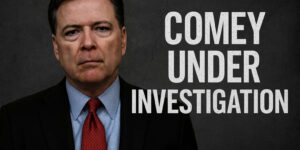This Candidate Missed Vote on Audit the Fed
One year ago, U.S. Sen. Ted Cruz (R-Texas) joined with Sen. Rand Paul (R-Ky.) in support of the Federal Reserve Transparency Act, otherwise known as “Audit the Fed.”
On Jan. 10, 2015, Cruz announced he was opposing now-Federal Reserve Chair Janet Yellen’s appointment, saying he was concerned about “policies that continue to irresponsibly print money”:
“We’re five years into the Federal Reserve’s quantitative easing program, and the economy is stuck in malaise. Printing money by the trillions is dangerous, and working people need real economic growth to get their lives back on track.
“Janet Yellen has said she intends to continue current Fed policy, which may help Wall Street but is leaving Main Street with higher prices for gas and food, near-zero interest rates for savers, and stagnation for small businesses that aren’t growing or hiring. Meanwhile, workers’ wages remain depressed and most households haven’t recouped their lost wealth from the recession.
“I’m also troubled that Ms. Yellen continues to oppose full transparency at the Fed—we need to audit the Fed now, so the American people can fully understand the scope and consequences of its recent extraordinary policies.”
Cruz, who is frequently lauded for “doing what he says he will do,” signed on as a co-sponsor of Paul’s Audit the Fed legislation. In doing so, he said:
“At long last, it’s time for a complete audit of the Federal Reserve, so the American people can fully understand the scope and consequences of the agency’s extraordinary monetary policy since 2008.
“The Fed has expanded its balance sheet fivefold, yet economic growth is still tepid, businesses are sitting on cash, and median income and household wealth are depressed. Americans are living with near-zero interest rates on their savings while entrepreneurs and small businesses report credit is still hard to get. Quantitative easing has contributed to the dollar’s volatility in recent years, which destabilizes the financial system and distorts investment. Other than elevating the stock market and key prices such as oil until lately, the Fed’s policies have not resulted in a long-term cure for our sick economy.
“Enough is enough. The Federal Reserve needs to fully open its books so Congress and the American people can see what has been going on. This is a crucial first step to getting back to a more stable dollar and a healthy economy for the long term.”
A lot has changed in the past 12 months. Both senators have become GOP presidential candidates, with Cruz becoming one of the front-runners for the party’s nomination. Paul, while not as successful in the polls, did earn a key victory just before the Christmas holiday break: a key vote on his Audit the Fed bill.
While the cloture vote held Tuesday in the Senate was not a vote on final passage, it was a key procedural vote that could have overridden a Democrat filibuster of the legislation. President Obama and the Democrat leadership in the Senate have opposed the bill, as have a handful of Republican lawmakers.
Cloture measures require a 60-vote supermajority to pass. The vote Tuesday failed with 53 Yeas and 44 Nays. Among the three senators not voting, however, was Cruz. All three of the other senators running for president—Paul, Marco Rubio (R-Fla.), and Bernie Sanders (D-Vt.)—were present and voted in favor of the motion.
According to his presidential campaign schedule, Cruz was traveling in New Hampshire at the time of the vote. While on the trail, he received the endorsements of U.S. Reps. Paul Gosar (R-Ariz.) and Alex Mooney (R-W.Va.).
His campaign has not yet explained the absence. However, following the vote on the omnibus spending bill last month, a measure that also required 60 votes, the Cruz camp blasted Rubio on social media—going so far as to launch the #NoShowMarco hashtag—to criticize the Florida senator’s absence.
His own defense, Rubio said not showing up to vote, because of the 60-vote threshold required for adoption of the measure, was tantamount to voting “Nay.”
While missed votes by members of Congress who are running for president are not uncommon, both Cruz and Rubio have been criticized for their respective volumes of missed votes since launching their presidential campaigns.
Rubio missed 32.9 percent of votes from April to July of 2015, 53.8 percent of votes from July to October, and 58.2 percent of votes from October to January. Cruz, on the other hand, missed 37.6, 13.5, and 29.9 percent, respectively. According to GovTrack.us, which charts the votes of all members of Congress, the lifetime average of missed votes for sitting U.S. Senators is 1.7 percent.
Sanders, who is challenging Hillary Clinton for the Democrat nomination, missed 4.7 percent of votes in the second quarter of 2015, 5.8 percent in the third quarter, and 28.4 percent as he ramped up his campaign during the fourth quarter. Paul missed 0, 7.7, and 20.9 percent, respectively.






































